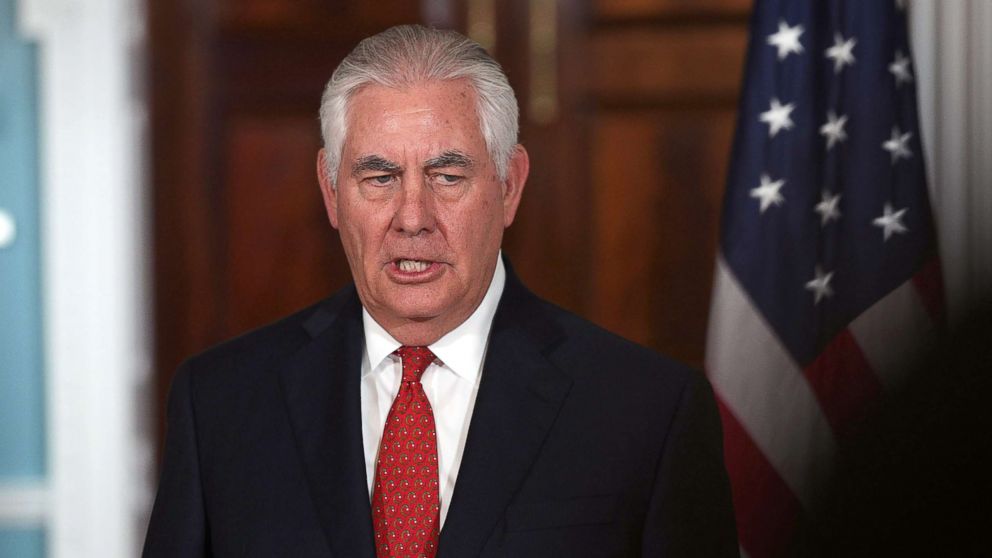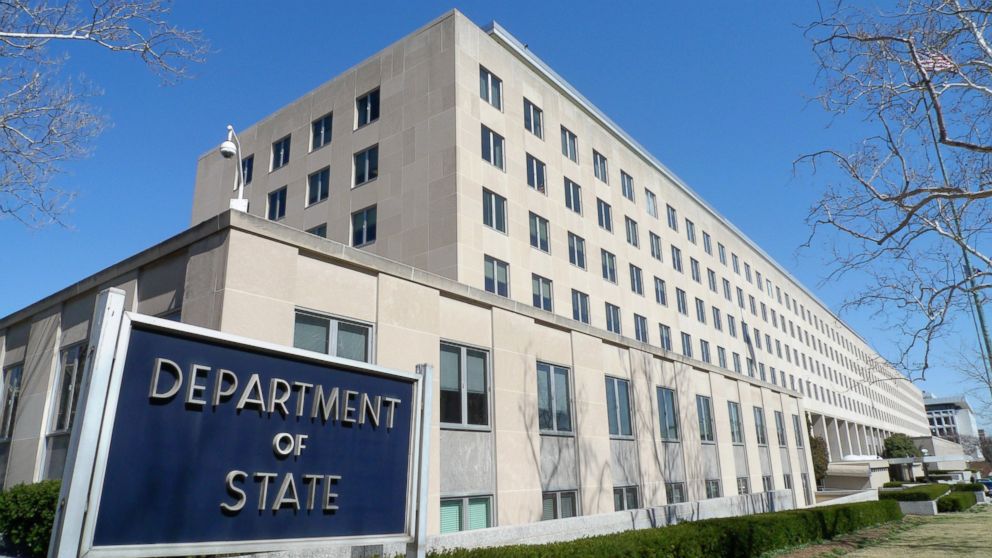Trump administration has yet to fill many US ambassador posts in Europe
Twenty ambassador positions in Europe remain open.

— -- When Secretary of State Rex Tillerson arrived at the Vienna airport this week, he was greeted on the tarmac by three deputy chiefs of mission from the U.S. embassies in Austria.
Of the three U.S. missions in Austria – the U.S. embassy to Austria, the embassy for Organization for Security and Co-operation in Europe, and the United Nations embassy – there isn’t a single ambassador leading the foreign offices 10 months into Tillerson’s term.
The State Department has also not yet put forth a name to the White House for nomination to eventually serve as ambassador to the European Union, a major international organization that represents 28 European countries and the largest single market in the world with 200 million consumers.
A White House official said they are still in the process of selecting an EU ambassador and it should be announced soon.
There are 20 ambassadorship postings — both political appointee and career — still open across Europe.
Tillerson's tensions with the White House have only exacerbated the slow pace of the White House's nominating and the Senate's confirming ambassadors, according to a State Department official and a White House Official.
“I think it’s a shame,” former U.S. Ambassador to the EU Anthony Gardner told ABC News about the comparatively small number of ambassadors in Europe. “Some of these posts are quite important, particularly now.”
A State Department spokesperson referred questions about political-appointee ambassador vacancies to the White House Office of Personnel, which submits its selections to the State Department.
“We have worked closely with the State Department to get ambassadorship positions filled and have had great success in getting some of the most qualified and credible individuals in place to serve as representatives for our country,” White House spokesperson Sarah Sanders said.

Nomination process slowed to a crawl
Before taking office, President Donald Trump told all politically-appointed ambassadors that they had to vacate the posts by Inauguration Day on Jan. 20 He made clear there would be “no exemptions,” according to The New York Times.
This left a vacuum at embassies that has yet to be filled, as a third of ambassadors are political appointees.
The process for nominating and confirming ambassadors is an arduous one that takes three months at best. It starts with the White House Office of Personnel submitting its list of nominees to the State Department, which sends back its approvals to the White House to then nominate the ambassadors to the Senate for confirmation.
Nominees must go through a rigorous, FBI vetting process after they’ve been approved by the White House. They must also go to ambassador school for training.
For career ambassadors, the State Department offers selected names to the White House for approval, which are then put to the Senate for confirmation.
But State Department sources say the process has slowed to a crawl.
One White House official complained that Tillerson has been reluctant to approve ambassador recommendations from the White House because they are more ideologically aligned with Trump than the secretary of state's “establishment” positions.
But a State Department official countered that the agency has been stifled by severe political filtering of potential career appointees.
The official said the White House is shutting out nominees seen as too politically aligned with the Obama administration or too deeply involved in policy decisions that Trump has vowed to repeal, like the Iran nuclear deal.
'Working through the process'
All of this has had a big impact on U.S. diplomacy, sources tell ABC News.
“The ambassador gets access that’s hard to replicate. For sensitive negotiations, there’s no alternative to having someone on the ground to have those conversations," said Gardner, the former envoy to the EU who, before Trump took office, was working on sensitive issues like privacy shields and trade.
At Tillerson’s first stop in Brussels, he gave a pep talk to U.S. diplomats based in Belgium working in the NATO, European Union and Belgian missions.
At the residence for the U.S. ambassador to Belgium, where no ambassador is currently living, Tillerson noted the elephant in the room.
"We're still awaiting a lot of nominees to clear the processes and be confirmed," Tillerson said. "I get a little criticism for that from time to time."
He added, "The State Department is not missing a beat because we're still working through the process.”
Tillerson was introduced by NATO Ambassador Kay Bailey Hutchinson, the only political appointee carrying out her term from the three embassies in Belgium.
After Brussels, he stopped at a U.S. Air Force base in Germany to be briefed for his upcoming trip to Africa in 2018. But again, he was not greeted by an ambassador.
In Germany, there is a nominee for ambassador, Richard Grenell, who is awaiting Senate confirmation.
U.S. Ambassador to France Jamie McCourt, a businesswoman from California, was confirmed by the Senate in November along with four other ambassadors to European countries including Spain, Croatia, Switzerland and Denmark.
U.S. Ambassador to the United Kingdom Woody Johnson was confirmed in August.
In addition, Wess Mitchell was recently confirmed as the assistant secretary of state for European and Eurasian Affairs. He’s based in Washington, D.C.
A sharp contrast
The empty ambassador posts in Europe contrast sharply with the status of similar positions in other parts of the world.
Trump was quick to name his ambassadors to Israel and China, two countries he made a priority on the campaign trail. He said he could solve Middle East peace and fix China’s currency manipulation.
Traditionally, the European Union has been a close ally of the U.S.
But Trump in July tweeted his support for the U.K. breaking away from the EU.
“Working on major Trade Deal with the United Kingdom. Could be very big & exciting. JOBS! The E.U. is very protectionist with the U.S. STOP!” Trump tweeted.
Brexiteer and anti-EU politician Nigel Farage has been a friend and surrogate for Trump with a similar populist message.
A White House official said the timing of ambassador appointments has nothing to do with priority, but more to do with the length of the background check process and the acceptance of the nominee by the host country.
And, one senior EU diplomat said vacancies in U.S. embassies are the not the most important concerns in dealing with the new administration.
“It doesn’t matter who the ambassadors are, it’s the policy,” the diplomat said.




